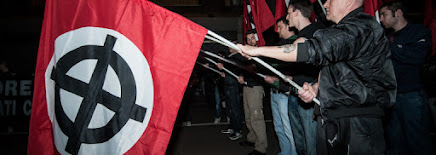First, and before I go any further, thanks for visiting my blog – I hope you’ll find it informative and interest you enough to make you want to come back. As I sued to 10 years ago, at the bottom of all my posts, I’ll leave space for you to comment, or ask questions on any of the topics, so feel free to participate in any way you feel appropriate. Most of my posts will be about fascism past and present as well as the far-right in the UK and some of my opinions won’t meet with everyone’s approval, particularly if you are, or have been a supporter of a British far-right, fascist or neo-Nazi group – so be warned. I’m not setting out to offend people, but equally, I think it would be dishonest if I tried to pretend that I have no opinion on the matter. I do (I would describe myself as anti-fascist) and with this in mind, you need to know that discussion and different views will always be welcomed, but any offensive comments directed directly towards me or any contributors will be deleted and repeat offenders will be blocked from making further comments.
Harsh I know, but I want this to be a safe space for moderate and liberal people to speak freely and without fear of being abused.
As for me, I first became “interested” in the far-right as a teenager and watched with interest and concern as groups like the National Front, National Party and British National Party grew and then faded away into near oblivion. It didn’t take very long for me to move from being a student sitting on the side-lines into becoming an activist and one of the early members of the Anti-Nazi League (ANL) in the South-West of England. As the years went by and the clashes between the far-right and ‘anti-fascist became fewer, I returned to being a student (albeit informally) as I was particularly interested in understanding their history and political ideology. In all this I was fired by a single question – ‘How could ultra-nationalist, anti-democratic ‘political soldiers’ attract support after all the misery and horror of the Second World War’?
I never really found an answer.
But what I did notice was that over the years, I heard liberals, left-wingers and ‘anti-fascists’ call their opponents “fascist”, “Nazi”, “far-right”, or “neo-Nazi” without regard for whether these labels were accurate. As I listened, it seemed most of the people were using these terms as abuse rather than with any concern for accurate political labelling. So, Margaret Thatcher became a “Nazi” with no evidence she was antisemitic (yes, that is how it should be spelt!) and Tony Blair was a ‘fascist’ because of his action against Saddam Hussein. Then, as this labelling became more common the power behind the words started to wane, until finally two mates drinking in a pub arguing about their local club football match might end up calling each other ‘fascist’, almost as an amiable (but with no offence meant) slur.
So, I decided to resurrect this blog, but this time I. I wanted to define these terms and see if others were also concerned about how we are watering down our language by using terms like ‘Nazi’. In all of this, I wanted to rediscover:
With this as a foundation, I began to set about the task and as I did, I realised that it was impossible to discuss these terms without looking into the history of British and European fascism. So, it became clear that another aspect of this blog would be to go on to explore the nature and history of the far right in Britain tracing its roots from about the start of the twentieth century and following through to the present day. As part of this, it became clear to me that it was essential to look at the people behind these groups and how their views made them into some of the most hated people of their time.
I hope you agree it’s an exciting project and I look forward to sharing it with you.


No comments:
Post a Comment